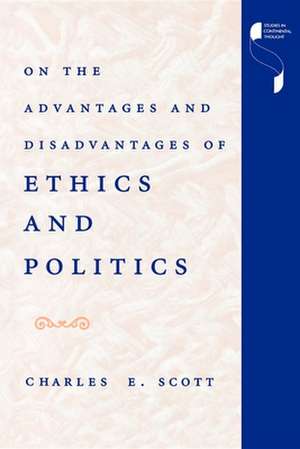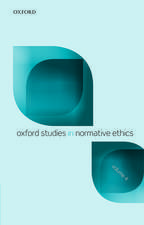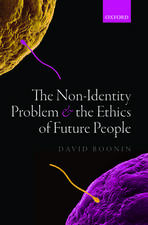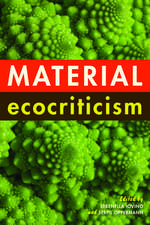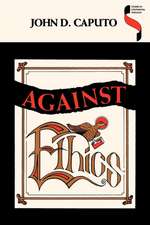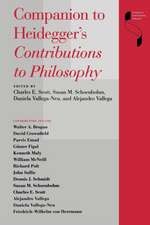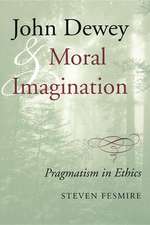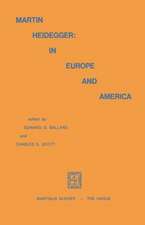On the Advantages and Disadvantages of Ethics and Politics
Autor Charles E. Scotten Limba Engleză Paperback – 21 oct 1996
Preț: 148.61 lei
Nou
Puncte Express: 223
Preț estimativ în valută:
28.44€ • 29.58$ • 23.84£
28.44€ • 29.58$ • 23.84£
Carte tipărită la comandă
Livrare economică 14-28 martie
Preluare comenzi: 021 569.72.76
Specificații
ISBN-13: 9780253210760
ISBN-10: 0253210763
Pagini: 216
Dimensiuni: 156 x 235 x 15 mm
Greutate: 0.37 kg
Ediția:Enlarged.
Editura: MH – Indiana University Press
ISBN-10: 0253210763
Pagini: 216
Dimensiuni: 156 x 235 x 15 mm
Greutate: 0.37 kg
Ediția:Enlarged.
Editura: MH – Indiana University Press
Cuprins
Acknowledgments
Selected Works Cited
Introduction: Crossing the Ethical by ÒtheÓ Nonethical
1. Nonbelonging/Authenticity
2. Language in a Passing Sense of Transcendence
3. Ethics in a Passing Sense of Transcendence
4. A (Non-) Passing Sense of Tragedy
5. Thinking Noninterpretively
6. The Ascetic Ideal: Nietzsche contra Heidegger
7. Transition: ÒWhat Is Paris Doing to US?Ó
8. Self-Fragmentation: The Danger to Ethics
9. ÒNot to Be Trapped by Abuse...Ó: Genealogy and a ChildÕs Pain
10. Responsibility and Danger
11. A PeoplesÕ Witness beyond Politics
12. Democratic Space
13. On the Advantages and Disadvantages of Politics for Life
Notes
Index
Selected Works Cited
Introduction: Crossing the Ethical by ÒtheÓ Nonethical
1. Nonbelonging/Authenticity
2. Language in a Passing Sense of Transcendence
3. Ethics in a Passing Sense of Transcendence
4. A (Non-) Passing Sense of Tragedy
5. Thinking Noninterpretively
6. The Ascetic Ideal: Nietzsche contra Heidegger
7. Transition: ÒWhat Is Paris Doing to US?Ó
8. Self-Fragmentation: The Danger to Ethics
9. ÒNot to Be Trapped by Abuse...Ó: Genealogy and a ChildÕs Pain
10. Responsibility and Danger
11. A PeoplesÕ Witness beyond Politics
12. Democratic Space
13. On the Advantages and Disadvantages of Politics for Life
Notes
Index
Recenzii
Scott (Pennsylvania State Univ.), a leading author in the field of American Continental philosophy, writes from a vantage point beyond ethics, though the essence of beyond here is neither hostile to ethics nor standing above the ethical domain. He claims that Nietzsche and such contemporary philosophers as Heidegger, Levinas, Foucault, and Derrida argue persuasively that we no longer can think and justify our acts within the traditional framework of transcendence. Nevertheless, this does not imply an absence of ethics or renunciation of the legitimacy of ethical concerns. In fact Scott celebrates this apparent loss of transcendence as what frees ethics from its excess. This remarkable account of the impact of postmodern philosophy on the question of ethics and politics is particularly insightful in discussing the genealogical approach to practical philosophy that characterizes the work of Nietzsche and Foucault. The work is commendable also for its balanced view of Heidegger's relationship to politics and ethics. Scott offers an excellent account of Heidegger's philosophical understanding of technology, seeing evidence there of both of a lingering moral asceticism and a mode of temporally rooted questioning that overcomes ethical subjectivity and its notion of responsibility. Upper--division undergraduate; graduate; faculty.W. A. Brogan, Villanova University, 1997oct CHOICE.--W. A. Brogan, Villanova University, 1997oct CHOICE.
Notă biografică
Charles E. Scott
Descriere
Provocatively examines the paradox that our ethical and political ideals and values may perpetuate the very evils they intend to prevent.
